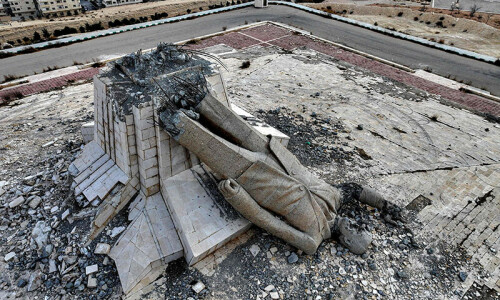TODAY, more than 3.6 per cent of the world’s population comprises migrants. About 39pc of the total refugee population is hosted by only five countries, Turkey, Colombia, Uganda, Pakistan and Germany.
Pakistan continues to host more than 1.4 million refugees, most of them hailing from Afghanistan. In a shift from its previous policy after the Taliban takeover, Pakistan decided to fence its borders to prevent another deluge of Afghan refugees from entering the country. However, Pakistan still hosts a significant number of refugees who are either in transition or temporarily stuck here while trying to relocate to Western countries.
Due to their being disenfranchised by the government of their home, destination or transition country, refugees often face discrimination, poor living conditions and inadequate access to basic rights and facilities, including healthcare. The Covid-19 pandemic, while posing a number of other challenges, helped renew interest in the intricate and crucial relationship between healthcare and migration.
One way to think about delivering healthcare to refugees and migrants is to think of health challenges linked with each phase of the migration framework.
Health policies should be sensitive to migration patterns.
The migration process can be categorised into pre-travel, travel, destination and return phases. Each phase of the migratory process throws up its own unique and specific health-related challenges.
For example, the pre-departure phase, covering the period before migrants or refugees leave their country of origin, assumes importance with reference to local chronic disease patterns, pathogens and infectious diseases. Non-communicable diseases such as diabetes and infectious ones such as tuberculosis — both prevalent in Pakistan — need prior and different management even in the pre-departure phase. Many Western countries require visa applicants to get tested for tuberculosis.
From the global health perspective, the travel phase, involving transition and interception countries, is deemed critical since people may become carriers of different pathogens or diseases and carry them across borders. The travel restrictions imposed by countries during the Covid-19 pandemic are a classic example of this phenomenon.
However, for illegal migrants or victims of human trafficking, who often travel on flimsy boats or trek for long periods of time through harsh terrains, only to be stopped or detained by border forces, access to a fraction of the scant healthcare provisions at the border becomes an insurmountable challenge.
Meanwhile, the destination phase comprises the period when individuals settle in a country either for temporary or long-term purposes. Most of the existing research in this area focuses on this group of migrants/refugees due to the availability of better data and well-funded research programmes in host countries.
Even though most of the migrants tend to be younger, the effect of their journeys on their mental health and low socioeconomic status in host countries exacts a heavy toll on their long-term physical well-being.
The final phase of the migration cycle is the return of refugees or migrants. This mainly happens for two reasons. Governments of host countries deport refugees after finding their claims to be unsubstantial. Meanwhile, a large number of Pakistani migrants tend to return to their home countries after spending years abroad.
This phase also carries its own health challenges. Depending on the manner of deportation, many returnees come back with serious injuries and, in extreme cases, in body bags. However, even if the return of migrants appears relatively safe, health systems in Pakistan are ill-equipped to offer the level of services available in the West. This also tends to affect the health of elderly returnees.
In Pakistan, several international organisations, such as the WHO, UNHCR and IOM, are involved in the health assessment process, along with a number of national and international NGOs. However, policymaking on the conjoined areas of health and migration is weak and disjointed. This is despite the fact Pakistan has one of the world’s highest rates of rural-to-urban migration.
With population mobility being an ubiquitous phenomenon, health strategies also need to be revised to fit the patterns of social mobility. Such policies are likely to be more effective if migration phases are kept in mind while framing new policies. Pakistan, despite its long experience in managing Afghan refugees, has not thought through the issues of health and migration in an integrated and synergised manner. The recent wave of Afghan refugees has highlighted the need for developing a holistic strategy for tackling health-related challenges arising out of increasingly complex migration processes and journeys.
The writer is author of Patient Pakistan: Reforming and Fixing Healthcare for All in the 21 Century.
Twitter: @arifazad5
Published in Dawn, March 31st, 2022













































Dear visitor, the comments section is undergoing an overhaul and will return soon.